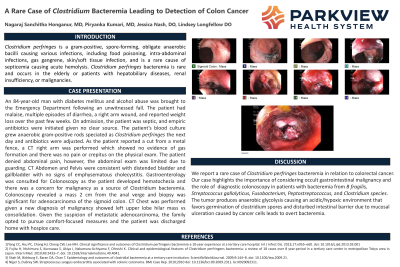Monday Poster Session
Category: Colon
P1710 - Clostridium Bacteremia Leading to Detection of Colon Cancer
Monday, October 23, 2023
10:30 AM - 4:15 PM PT
Location: Exhibit Hall

Has Audio

Kumari Piryanka, MD
Parkview Medical Center
Pueblo, Colorado
Presenting Author(s)
Nagaraj Sanchitha Honganur, MD, Jigisha Rakholiya, MD, Kumari Piryanka, MD, Jessica Nash, DO, Lindsey Longfellow, DO
Parkview Medical Center, Pueblo, CO
Introduction: Clostridium perfringes is a gram-positive, spore-forming, obligate anaerobic bacilli causing various infections, including food poisoning, intra-abdominal infections, gas gangrene, skin/soft tissue infection, and is a rare cause of septicemia causing acute hemolysis. Clostridium perfringes bacteremia is rare and occurs in the elderly or patients with hepatobiliary diseases, renal insufficiency, or malignancies.
Case Description/Methods: An 84-year-old man with diabetes mellitus and alcohol abuse was brought to the Emergency Department following an unwitnessed fall. The patient had malaise, multiple episodes of diarrhea, a right arm wound, and reported weight loss over the past few weeks. On admission, the patient was septic, and empiric antibiotics were initiated given no clear source. The patient’s blood culture grew anaerobic gram-positive rods speciated as Clostridium perfringes the next day and antibiotics were adjusted. As the patient reported a cut from a metal fence, a CT Right arm was performed which showed no evidence of gas formation and there was no pain or crepitus on the physical exam. The patient denied abdominal pain, however, the abdominal exam was limited due to guarding. CT Abdomen and Pelvis were consistent with distended bladder and gallbladder with no signs of emphysematous cholecystitis. Gastroenterology was consulted for colonoscopy as the patient developed hematochezia and there was a concern for malignancy as a source of Clostridium bacteremia. Colonoscopy revealed a mass 2 cm from the anal verge and biopsy was significant for adenocarcinoma of the sigmoid colon. CT Chest was performed given a new diagnosis of malignancy showed left upper lobe hilar mass vs consolidation. Given the suspicion of metastatic adenocarcinoma, the family opted to pursue comfort-focused measures and the patient was discharged home with hospice care.
Discussion: We report a rare case of Clostridium perfringes bacteremia in relation to colorectal cancer. Our case highlights the importance of considering occult gastrointestinal malignancy and the role of diagnostic colonoscopy in patients with bacteremia from B fragilis, Streptococcus gallolyticus, Fusobacterium, Peptostreptococcus, and Clostridium species. The tumor produces anaerobic glycolysis causing an acidic/hypoxic environment that favors germination of clostridium spores and disturbed intestinal barrier due to mucosal ulceration caused by cancer cells leading to overt bacteremia.
Disclosures:
Nagaraj Sanchitha Honganur, MD, Jigisha Rakholiya, MD, Kumari Piryanka, MD, Jessica Nash, DO, Lindsey Longfellow, DO. P1710 - Clostridium Bacteremia Leading to Detection of Colon Cancer, ACG 2023 Annual Scientific Meeting Abstracts. Vancouver, BC, Canada: American College of Gastroenterology.
Parkview Medical Center, Pueblo, CO
Introduction: Clostridium perfringes is a gram-positive, spore-forming, obligate anaerobic bacilli causing various infections, including food poisoning, intra-abdominal infections, gas gangrene, skin/soft tissue infection, and is a rare cause of septicemia causing acute hemolysis. Clostridium perfringes bacteremia is rare and occurs in the elderly or patients with hepatobiliary diseases, renal insufficiency, or malignancies.
Case Description/Methods: An 84-year-old man with diabetes mellitus and alcohol abuse was brought to the Emergency Department following an unwitnessed fall. The patient had malaise, multiple episodes of diarrhea, a right arm wound, and reported weight loss over the past few weeks. On admission, the patient was septic, and empiric antibiotics were initiated given no clear source. The patient’s blood culture grew anaerobic gram-positive rods speciated as Clostridium perfringes the next day and antibiotics were adjusted. As the patient reported a cut from a metal fence, a CT Right arm was performed which showed no evidence of gas formation and there was no pain or crepitus on the physical exam. The patient denied abdominal pain, however, the abdominal exam was limited due to guarding. CT Abdomen and Pelvis were consistent with distended bladder and gallbladder with no signs of emphysematous cholecystitis. Gastroenterology was consulted for colonoscopy as the patient developed hematochezia and there was a concern for malignancy as a source of Clostridium bacteremia. Colonoscopy revealed a mass 2 cm from the anal verge and biopsy was significant for adenocarcinoma of the sigmoid colon. CT Chest was performed given a new diagnosis of malignancy showed left upper lobe hilar mass vs consolidation. Given the suspicion of metastatic adenocarcinoma, the family opted to pursue comfort-focused measures and the patient was discharged home with hospice care.
Discussion: We report a rare case of Clostridium perfringes bacteremia in relation to colorectal cancer. Our case highlights the importance of considering occult gastrointestinal malignancy and the role of diagnostic colonoscopy in patients with bacteremia from B fragilis, Streptococcus gallolyticus, Fusobacterium, Peptostreptococcus, and Clostridium species. The tumor produces anaerobic glycolysis causing an acidic/hypoxic environment that favors germination of clostridium spores and disturbed intestinal barrier due to mucosal ulceration caused by cancer cells leading to overt bacteremia.
Disclosures:
Nagaraj Sanchitha Honganur indicated no relevant financial relationships.
Jigisha Rakholiya indicated no relevant financial relationships.
Kumari Piryanka indicated no relevant financial relationships.
Jessica Nash indicated no relevant financial relationships.
Lindsey Longfellow indicated no relevant financial relationships.
Nagaraj Sanchitha Honganur, MD, Jigisha Rakholiya, MD, Kumari Piryanka, MD, Jessica Nash, DO, Lindsey Longfellow, DO. P1710 - Clostridium Bacteremia Leading to Detection of Colon Cancer, ACG 2023 Annual Scientific Meeting Abstracts. Vancouver, BC, Canada: American College of Gastroenterology.
